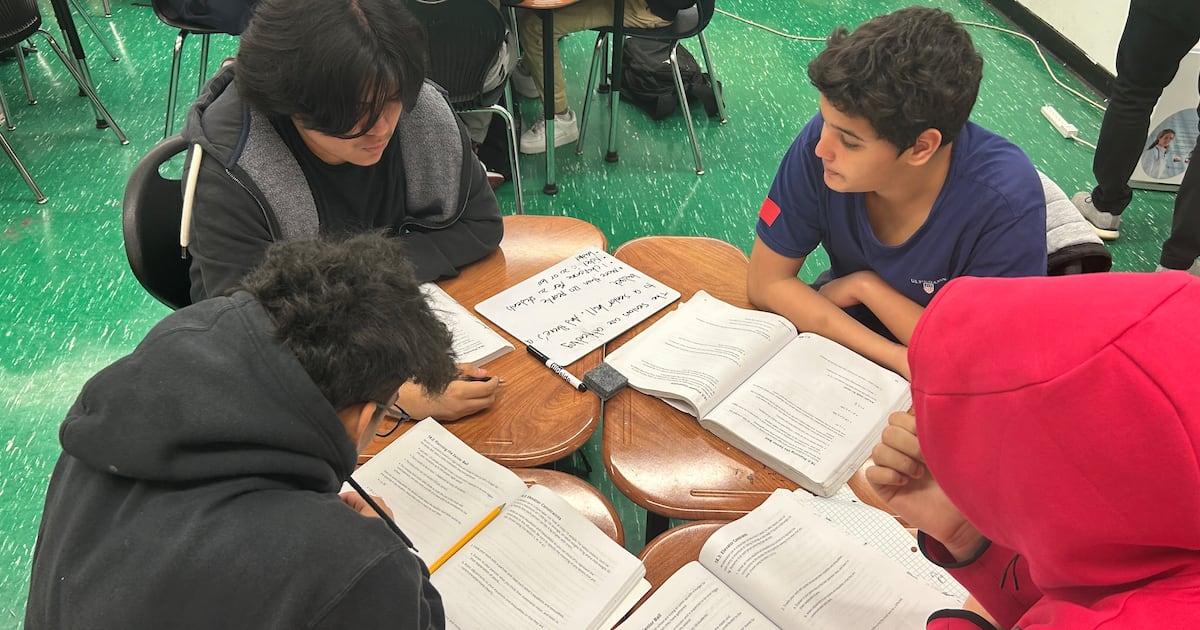Alabama’s Higher Education Commission (ACHE) gave the green light on Frida …
Six New York City high schools granted exemption from new math curriculum mandate
Jennifer Livingstone

Subscribe to
New York City is implementing a substantial transformation of algebra instruction through a new curriculum mandate, with certain specialized high schools being exempted from the initiative, as confirmed by officials this week.
By the beginning of the next academic year, 420 high schools in the city will be mandated to adopt the Imagine Learning Illustrative Math curriculum for Algebra 1, as part of an effort to address the decline in math performance following the pandemic.
The Education Department has approved exemptions for only six schools, all specialized high schools that admit students based on a single standardized test.
The exempted schools are Stuyvesant High School, Brooklyn Technical High School, Brooklyn Latin High School, High School for Math Science and Engineering at City College, Bronx High School of Science, and the High School of American Studies at Lehman College.
According to officials, these schools were allowed to opt out of the new curriculum due to their high academic achievements and existing support systems. Most students at these schools complete and pass Algebra 1 during middle school.
Moreover, 36 consortium high schools, which are exempt from state Regents exams and evaluate student performance through capstone projects, will not be required to implement new curriculum materials until the 2025-26 school year. Education Department spokesperson, Nicole Brownstein, mentioned that these schools will have alternative curriculum options beyond Illustrative Math. District 75 schools, catering to students with more complex disabilities, will also have additional time to integrate a new math curriculum.
Math Overhaul as Part of Broader Instructional Changes
Schools Chancellor David Banks has emphasized revamping classroom materials, especially in elementary school reading, during his tenure. He has been hesitant to grant exceptions to these directives. Only one school, a gifted and talented institution in Brooklyn, has been permitted to bypass the reading curriculum overhaul.
Multiple experts, advocacy groups, and the city’s teachers union have expressed support for the curriculum changes, which enable extensive teacher training and minimize disruptions for students transferring schools.
President of Math for America, Maria Klawe, praised the Illustrative Math curriculum stating, “I think very highly of Illustrative Math – it’s a really good curriculum, and so it generally makes a lot of sense for the [Education Department] to standardize.” She added that exceptions could be made for schools or teachers with effective existing curriculum.
The decision to exempt most specialized schools, often perceived as prestigious, from the mandate has sparked frustration among some math educators.
Veteran math teacher at Bayside High School, Bobson Wong, questioned the rationale behind exempting only select schools, stating, “If the [Illustrative Math] curriculum is that good, then shouldn’t all schools be required to use it without modification?”
The city commenced the rollout of the Illustrative Math curriculum in 265 high schools during the 2023-24 school year, receiving mixed feedback from educators. In contrast to traditional math curriculums focusing on memorization, Illustrative Math aims to promote a deeper comprehension of mathematical concepts through real-world examples.
While some educators appreciate the curriculum’s emphasis on engaging classroom discussions and inclusivity for students of varying skill levels, others are concerned that the approach neglects essential math terminology and procedures, potentially leaving students ill-equipped to solve problems effectively. There are also fears that the curriculum may not align closely with state exam content required for high school graduation.
Official guidelines for exempting schools from the Algebra 1 mandate have not been specified. Regarding reading curriculum modifications, the Education Department clarified that exemption decisions are made on a case-by-case basis.
The Education Department did not elaborate on why only six out of the city’s eight test-in specialized high schools were exempt from the mandate, causing confusion among some institutions. At Staten Island Technical High School, administrators believed they were not obliged to implement the new curriculum.
Principal Mark Erlenwein mentioned, “As far as I know from my district support team, we’re exempt as well,” indicating that a minority of the school’s ninth graders were enrolled in Algebra 1 this year.
Brownstein refuted the school’s assumption of being exempt.
Teachers Await Information on Math Curriculum Transition
Despite obtaining an exemption for Stuyvesant High School, math teacher Gary Rubinstein suggested that the change had minimal impact, considering that nearly all incoming students had already completed Algebra 1. He cautioned against mandatory use of prescribed curricula in other subjects, alluding to potential challenges in effectively covering certain topics.
While the city introduces new math materials, some educators expressed concerns over the lack of clarity regarding training expectations. Schools involved in the initial phase of the curriculum rollout last year were informed about receiving intensive training sessions from Illustrative Math and job-embedded coaching sessions for teachers.
The Education Department did not disclose details about training plans for the upcoming school year, particularly for schools entering the program for the first time in the second phase of the rollout.
Bobson Wong, after reviewing the Illustrative Math curriculum, acknowledged its value and alignment with his teaching style. However, he highlighted potential rigidity in the new mandates, which could necessitate discarding established lessons. Wong also indicated a lack of information on the city’s strategies for preparing teachers adequately.
Anticipating minimal guidance until shortly before classes commence, Wong remarked, “I don’t expect anything to happen until two days before classes start, which is of course not enough time to learn how to use a new curriculum.”


